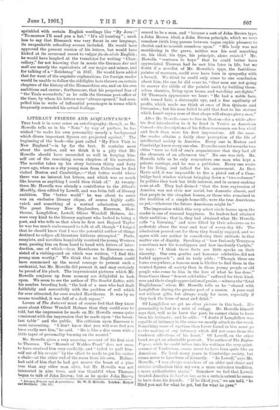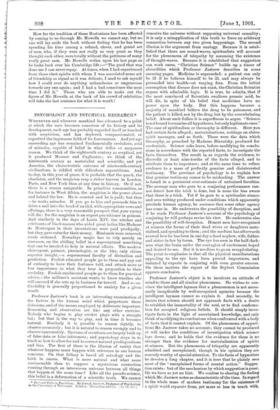LITERARY FRIENDS AND ACQUAINTANCE.* Tins book is in some sense
an autobiography, though, as Mr. Howells tells us in his " Note " by way of preface, he has wished "to make his own personality merely a background which divers important figures are projected against." The beginning of the book—the part called "My First Visit to New England"—is by far the best. It contains most about the author, and we think it is a pity that Mr. Howells should have succeeded so well in keeping him- self out of the remaining seven chapters of his narrative. The novelist takes up his story between thirty and forty years ago, when as a shy young man from Columbus he first visited Boston and Cambridge,—" that better world where there was no interest but letters, and which was as much like heaven as anything I could then think of." At twenty- three Mr. Howells was already a contributor to the Atlantic Monthly, then edited by Lowell, and was brim full of literary ambition. The "better world" he was about to enter was an exclusive literary clique, of course highly culti- vated, and something of a mutual admiration society. The great literary New Englanders, Emerson, Haw- thorne, Longfellow, Lowell, Oliver Wendell Holmes, &c., were very kind to the literary aspirant who looked to being a poet, and who tells us that when he first met Bayard Taylor he was too much embarrassed to talk at all, though "I longed that he should know that I was the potential author of things destined to eclipse all literature hitherto attempted." Poets, essayists, and novelists hospitably received the young Western man, passing him on from hand to hand with letters of intro- duction, one of which—from Hawthorne to Emerson—con- sisted of a visiting-card on which was written, "I find this young man worthy." We think that no Englishman could have summoned up the moral courage to present such a credential, but Mr. Howells did present it, and may certainly be proud of his pluck. The impressionist pictures which Mr. Howells conjures up from memory are delightful to look upon. We seem to see the author of The Scarlet Letter, with his sombre brooding look, "the look of a man who had dealt faithfully and sorrowfully with the problem of evil which for ever attracted, for ever evaded Hawthorne. It was by no means troubled, it was full of a dark repose."
Lovers of The Autocrat must of course feel that they know more about Oliver Wendell Holmes than they could ever be told, but the impression he made on Mr. Howells seems quite consistent with the impression that he made upon "the break- fast table" and the public. His criticism upon Emerson is most interesting. "I don't know that you will ever feel you have really met him," he said. "He is like a dim room with a little taper of personality burning on the mantel."
Mr. Howells gives a very amusing account of his first visit to Thoreau. The "Hermit of Walden Pond " does not seem to have received him very cordially, and "failed to pull him- self out of his reverie" by the effort he made to get his visitor a chair—at the other end of the room from his own. Holmes had said of him that he had got nearer the heart of a pine tree than any other man alive, but Mr. Howells was not interested in pine trees, and was thankful when Thoreau began to talk of John Brown ; but as he spoke John Brown
• Literanj Yriends and Acquaintance. By W. D. Hciwells. LOndon : Rarrer awl Brothem fibs. al
ceased to be a man, and "became a sort of John Brown type, a John Brown ideal, a John Brown principle, which we were somehow (with long pauses between vague orphic phrases) to cherish and to nourish ourselves upon." "His body was not mouldering in the grave, neither was his soul marching on, his ideal, his type, his principle, alone existed." Mr. Howells "ventures to hope" that he could better have appreciated Thoreau had he met him later in life, but we doubt if a novelist of Mr. Howells's type, the fastidious painter of manners, could ever have been in sympathy with a hermit. We think he could only come to one conclusion about him, the one he did come to, "that men ate not going to answer the riddle of the painful earth by building them- selves shanties, living upon beans, and watching ant-fights." Of Thoreau's appearance we hear : "He had a noble face, with tossed hair, a distraught eye, and a fine aquilinity of profile, which made me think at once of Don Quixote and Cervantes ; but his nose failed to add that foot to his stature which Lamb says a nose of that shape will always give a man."
After Mr. Howells came to live in Boston—for a while after his first introduction to it he lived in Venice as American Consul—his descriptions of his fellow-townsmen are less vivid and fresh than were his first impressions. All the same. the reader obtains a fairly clear perception of the life of intellectual society in America. Every one in Boston and Cambridge knew every one else. Even the cars between the two cities "were so full of one's acquaintance that they had all the elements of an afternoon tea." No one was rich. Mr. Howells tells us he only remembers one man who kept a private carriage, and he was a publisher. Every one wrote for his living, and talked for his amusement. As Brat Harts said, it was impossible to fire a pistol out of a Cam- bridge back window without bringing down a " two-volumer." In politics they took but little interest, and in money-making none at all. They had divined "that the true expression of America was not civic nor social, but domestic almost, and that people in the simplest homes, or those who remained in the tradition of a simple home-life, were the true Americans as yet,—whatever the future Americans might be."
The impression which this very select circle leaves upon the reader is one of unusual happiness. Its leaders had attained their ambition ; that is, they had obtained what Mr. Howells calls "a. listening," and were lifted by their admirers on to pedestals above the wear and tear of every-day life. The admiration poured out for them they frankly enjoyed, and we agree with our author in considering their attitude in that matter one of dignity. Speaking of how furiously Tennyson sometimes met his worshippers and how insolently Carlyle," he says "I think these facts are little specks on their sincerity. Our own gentler and honester celebrities did not forbid approach " ; and he truly adds : "Though there are bores everywhere, a famous man is likelier to find them in the wonted figures of society than in those young people or old people who come to him in the love of what he has done." Sometimes these "honest celebrities" suffered for their kind- ness and their simple appreciation of praise,—witness the "fatal Englishman," whom Mr. Howells tells us he "shared with Longfellow during the greater part of a season. A poor soul not without gifts, but always ready for more, especially if they took the form of meat and drink."
Of Longfellow we get no clear picture in this book. His personality is lost in a mist of eulogy. Mr. Howells himself says that, well as he knew the poet, he cannot claim to have been his intimate ; and he adds : "I doubt if Longfellow was capable of intimacy in the sense we mostly attach to the word. Something mone of egotism than I ever found in him must go to the making of any int imacy which did not come from the tenderest affections of his heart." Of Lowell, on the other band, we get an admirable portrait. The author of The Biglow Papers, while he could infuse into his writings the very quint- essence of Yankeeism, seems never to have been quite like an American. He lived many years in Cambridge society, but seems never to have been of it exactly. "In Lowell," says Mr. Howells, "I was always conscious of an older and closer and stricter civilisation than my own, a more unbroken tradition, a more authoritative status." Somehow we feel that Lowed treated America do haul en Las, as to a certain extent he seems to have done his friends. "If he liked you," we are told, "he liked you not for what he got, but for what he game."
How far the tradition of these Bostonians has been affected by coming to us through Mr. Howells we cannot say, but no one will lay aside the book without feeling that he has been spending his time among a refined, clever, and genial set of men, who, if they were not really so very great as they thought each other, were totally without the pettiness of many really great men. Mr. Howells writes upon his last page as he looks back over his Cambridge life :—" The good that was done me I can never repay. At times, when I had experienced from those elect spirits with whom I was associated some act of friendship as signal as it was delicate, I used to ask myself how I could ever do anything unhandsome or ungenerous towards any one again ; and I had a bad conscience the next time I did it." Those who are able to make out the figure of Mr. Howells at the back of his crowd of celebrities will take the last sentence for what it is worth !







































 Previous page
Previous page